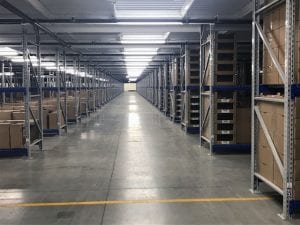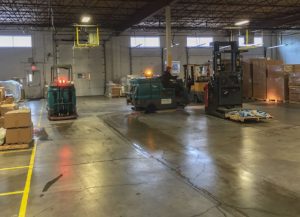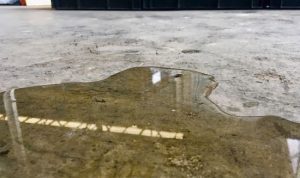Oftentimes companies overlook or undervalue the importance of industrial flooring from a first impression and safety perspective. Flooring is the first step in the door, both figuratively and literally, as cleanliness starts from the ground up. It also epitomizes the foundation of a business, and structural integrity is essential for a safe environment. Selecting the correct type of flooring based on the industry, environmental conditions, and the general work environment is critical to a business’s success.
These are some of the key considerations when it comes to industrial flooring:
Level Surfaces are Critical
While floors may be pristine, polished, and visually appealing, serious issues can occur if  they are not level. If there is a dip in the flooring, industrial racking can lean to one side, and the structural integrity may be compromised due to stress points and tilting. Product can fall off and be damaged. Forklifts on a slope can slide, causing significant challenges. From a commercial perspective, flooring that isn’t level can lead to pedestrian safety issues.
they are not level. If there is a dip in the flooring, industrial racking can lean to one side, and the structural integrity may be compromised due to stress points and tilting. Product can fall off and be damaged. Forklifts on a slope can slide, causing significant challenges. From a commercial perspective, flooring that isn’t level can lead to pedestrian safety issues.
Machine Wear and Tear Prevention
Solid flooring leads to significantly less unnecessary maintenance on forklifts due to the  conditions not being as harsh, minimizing vibration and being better for rolling stock stability.
conditions not being as harsh, minimizing vibration and being better for rolling stock stability.
Industrial flooring will save you money on the wear and tear of forklifts, protect everything from docks to shelves, and help with safe pallet loading and unloading. Debris on the ground can ruin tires, which are expensive to replace and are typically not included in forklift warranties.
Dust Mitigation
Dust-free environments are essential for calibrated machines. When flooring has pockets, dust can catch on tiny holes, pocketing places that are not smooth. Nice smooth surfaces are much easier to clean with a floor scrubber to help prevent dust from accumulating. While dust may not be an issue, and may even be expected, for some retail companies such as home improvement stores, it is very much a negative for high-end items plus anything in the food and beverage industry where cleanliness is of the utmost importance.
Moisture Control
Moisture is another critical factor in industrial flooring safety and cleanliness. If a forklift  operator encounters wetness, he could slide and prospectively create an unsafe situation for himself, others or your assets. High humidity levels also can cause erosion beneath the surface, leading to structural damage and machine wear and tear. Moisture and dust can both cause significant liability and safety considerations and/or asset devaluation.
operator encounters wetness, he could slide and prospectively create an unsafe situation for himself, others or your assets. High humidity levels also can cause erosion beneath the surface, leading to structural damage and machine wear and tear. Moisture and dust can both cause significant liability and safety considerations and/or asset devaluation.
What Are the Different Types of Industrial Flooring?
Different finishes exist, such as glossy epoxy, which is water-resistant, has a vapor barrier, and is adhesive. The right type of industrial flooring depends on the industry; if it is customer facing – go high gloss and use different colors for pedestrian walkways. In comparison, a warehouse with forklifts and heavy machinery may need a thicker epoxy that is stronger and more resilient.
The Source for All Your Industrial Flooring Needs
Hit the ground running with us! Abel Womack brings considerable expertise to our clients’ flooring needs. We are solution and cost-driven in helping our customers select the right flooring for their business.
Do you need more information on how Abel Womack can help you implement safe and pristine industrial flooring options? Please get in touch with our specialists today.



Leave a Reply
You must be logged in to post a comment.